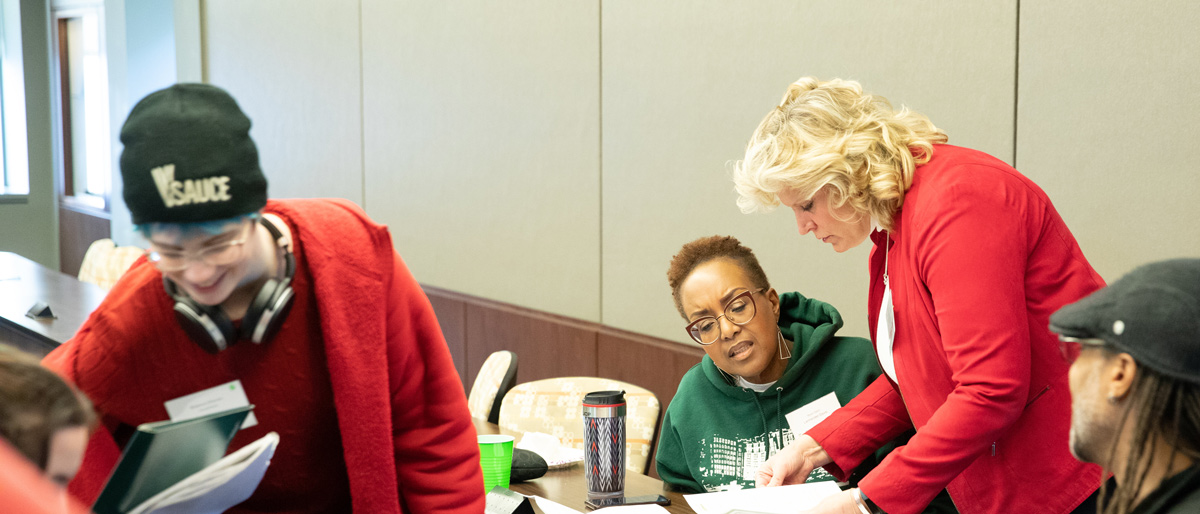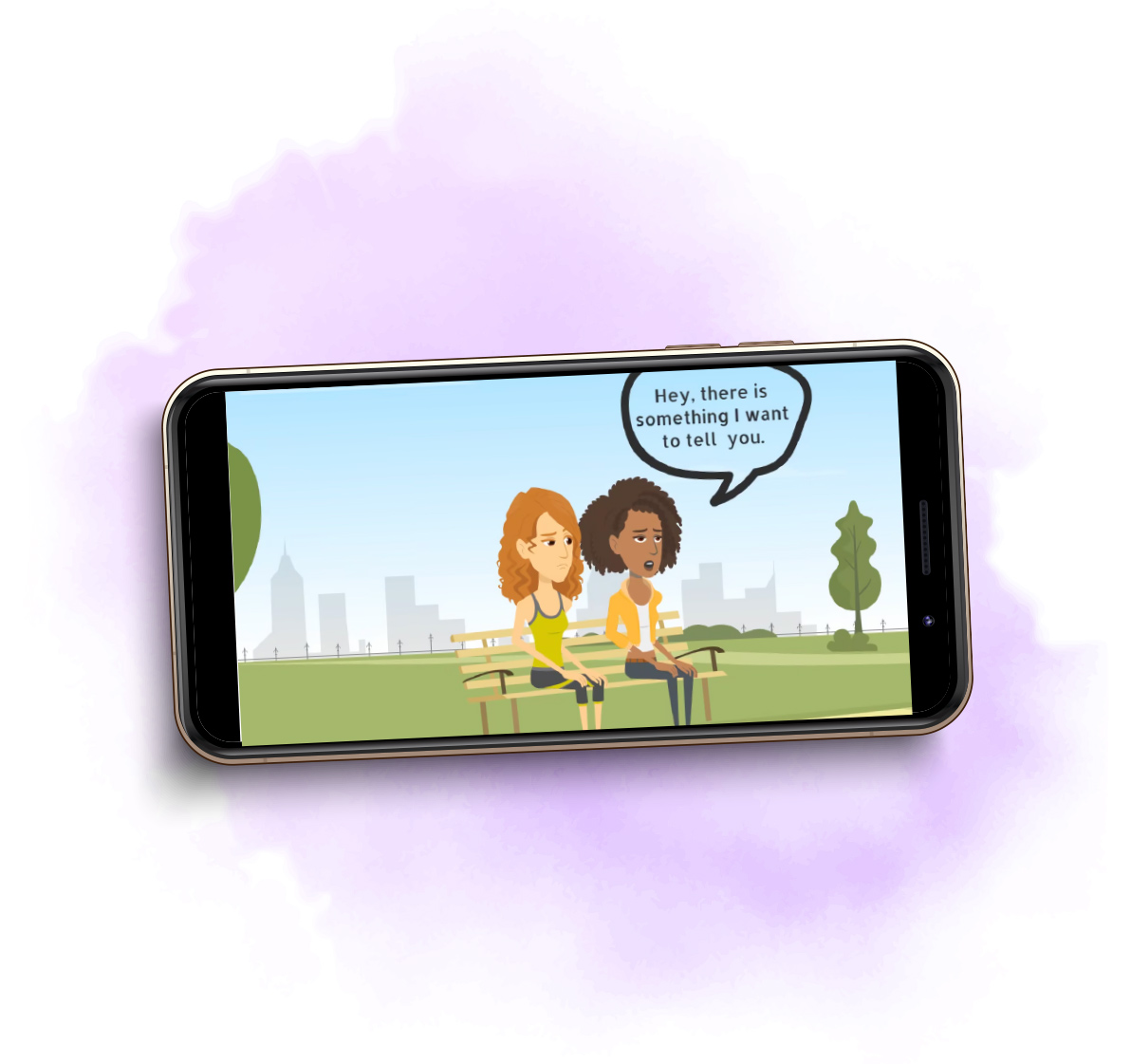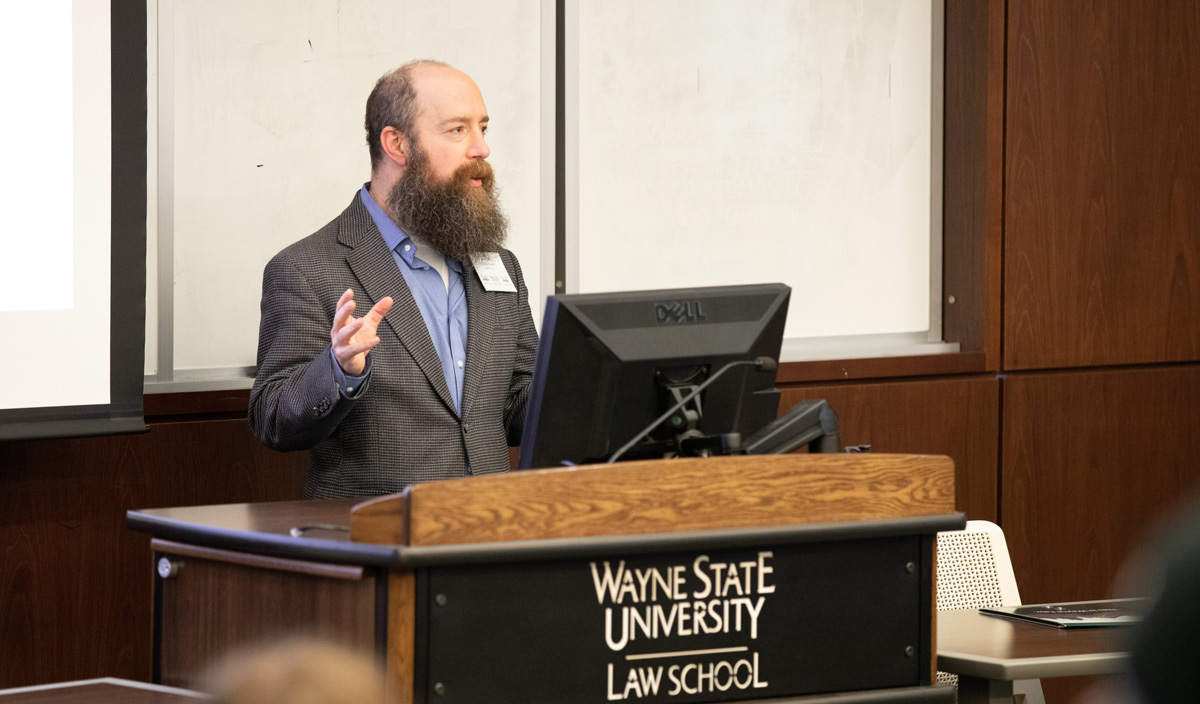

s director of Wayne State University Law School’s Legal Advocacy for People with Cancer (LAPC) Clinic, Kathryn Smolinski ’11 is fluent in the area of population health law.
“When you think about populations, individuals diagnosed with cancer is a population,” she said. “The number of cancer survivors and those affected by cancer — their caregivers, family members — is a huge population.”
Indeed, population health paints health status and outcomes in broader strokes, focusing less on the individual and more on those who fall within a particular group or category. Throughout COVID-19, population health has played a vital role in identifying who is most at risk.
And, as cancer rights attorney Joanna Fawzy Morales observes, the legal issues that the cancer community faced in previous years — access to care, health insurance, employment, etc. — are all the more urgent during a pandemic.
“There have been a lot of laws, programs and benefits that have rolled out that have kept us busy translating laws and regulations as fast as they come out for the cancer community so that people can tap into benefits as quickly as possible,” she said. “From a public health standpoint, things really haven’t changed — it’s just become more dire.”

Boiling it down
“Given that we were in a time of Zoom teaching, I thought it was a wonderful opportunity to [pursue] a national partner,” Smolinski said. She naturally thought to team up with Triage Cancer, a national nonprofit organization that provides legal resources to people diagnosed with cancer and their caregivers.
Morales — who launched Triage Cancer with sister Monica Fawzy Bryant in 2012 — jumped at the opportunity to teach the three-credit clinic with Smolinski in winter 2021.
While learning about the common legal issues that those within the cancer community navigate (think disability benefits and estate planning), students were paired with lawyers at Triage Cancer to develop the interviewing and counseling skills necessary to serve clients.

By the clinic’s end, each student had completed a project to be used by Triage Cancer, with deliverables ranging from drafting legislation and writing Quick Guides to creating modules for the nonprofit’s cancerfinances.org resource. For his project, Piner constructed a website module to guide people diagnosed with cancer through their housing rights; meanwhile, classmate Daniel Ayyash focused on an educational video, building on the creative background he’d developed during his undergraduate education.
Ayyash’s video, “Triage Cancer Explains: Privacy Choices After a Diagnosis,” centers on information disclosure for members of the cancer community. As a 2L, he did everything from creating the storyboards and writing the script to designing animation for the five-minute video.
“Any of us can go pick up a book and read the laws, but not everyone understands them or even has the desire to do that,” said Ayyash. “Trying to make it digestible and understandable for a layperson is super important because they are rights and benefits everyone should have access to.”

Moving upstream
“Many of these legal issues, like insurance or employment issues, are not exciting — they’re not things that people want to learn about, but they’re things that people need to learn about,” said Morales. “We’re trying to preempt some of the legal challenges that people face downstream by making sure that they have information.”
That level of prevention is critical in the eyes of Heather Walter-McCabe, who recently began a joint appointment as an associate professor in both the Law School and the School of Social Work.
“That’s the primary goal: to do as much as we can moving upstream to keep the issues from becoming a problem in the first place,” Walter-McCabe said. “Population health really does work looking at prevention through changing the structures that cause health inequities and illness, but then also looking at when those things don’t occur — looking at access and minimizing what disparities do exist in the population.”
A national voice on public health law and an experienced social worker, Walter-McCabe works at the intersection of law, social work and public health. While pursuing her master of social work at Indiana University, her final internship — through the Leadership Education in Neurodevelopmental and Related Disabilities (LEND) program — opened her eyes to the importance of interdisciplinary work as she collaborated with students from a variety of fields.

She’s bringing that collaborative spirit to her latest fellowship via the Robert Wood Johnson Foundation Social Work Futures Lab. Here, she’s exploring how the on-the-ground expertise that social workers develop in communities is essential to their seat at the policymaking table.
“My goal through this fellowship is to really get us thinking about how social workers can leverage the connections that they already have, both with policymaking and grassroots communities, to ensure that they’re talking to each other in a way that makes public health policy better — particularly policy looking at impacting disparities and inequities in the United States.”
Interpreting data
“The LGBTQ population — or people in the many groups under that rainbow umbrella — experiences inequitable health outcomes,” she said, citing disproportionate suicide rates. “There’s a growing body of work for health outcomes researchers trying to look at the impact that policy can have.”
For the past two years, Walter-McCabe has been building a national database of laws impacting LGBTQ populations, with a goal of providing clearer links between policies and health outcomes. She’s looking to see what each state provides for protections in areas such as housing, work equity and anti-discrimination, paying close attention to when certain laws have been implemented and how they are enforced.
She estimates that, at this point, she is just over halfway through the first batch of data, having coded nearly 5,000 statues and regulations.
“We’ll then be going back and doing more looks per jurisdiction to encapsulate what’s going on in each state,” Walter-McCabe said, noting that certain localities may have enacted additional policies to protect human rights in more restrictive states (take, for instance, progressive Marion County in Indiana).
Although she aims to have this database publicly accessible within the next couple years, the work will be ongoing.
“It’s a longitudinal study,” said Walter-McCabe, who began this project as a visiting scholar in the Centers for Disease Control and Prevention’s Public Health Law Program. “It’s going to need to be continually updated.”
She’s connected with leading researchers in sexual orientation as well as gender identity law and policy to determine that she’s gathering the information required to examine health equity in LGBTQ populations. This is one example of legal epidemiology: collecting data to measure and evaluate a law’s impact on health.
“If you think about law as a determinant of health, you can use legal epidemiology to evaluate scientifically — or, if not scientifically, at least empirically, to some extent — the effects that law is having on health,” said Professor of Law Lance Gable.
To further explain the concept of legal epidemiology, Gable posed a hypothetical scenario that, by 2021 standards, isn’t all that difficult to imagine.
“Is it better to have a law in place that puts strict requirements on people interacting during a pandemic, or is it better to have a law in place that provides people with money to stay home?” he said. “Having those two policies in place, you can evaluate which one is more effective.”
A measured response
“We knew from the start that it was just going to be a snapshot,” he said of the 35-chapter report, “because obviously, things were still very much in flux in terms of the legal issues. There were so many things evolving and happening at the same time.”
In March 2021, Gable and company released a follow-up report, “COVID-19 Policy Playbook: Legal Recommendations for a Safer, More Equitable Future,” which reflects on legal actions and orders implemented during the pandemic’s first wave and explores the change in policies and approaches that has come with the new administration.
As Gable sees it, these legal issues embody both short- and long-term priorities.
“There’s some serious COVID fatigue,” he said, “and as a result of that, it’s a lot harder, politically speaking, for leaders — at the federal level, at the state level, at the local level — to take some steps to stop the spread of the disease that might be necessary.”
From his perspective, Gable believes there are a variety of lessons to be learned from the pandemic response.
“We’ve seen how well some of the supportive legislation worked, where we provided people with money to stay home — incentivizing people and preventing them from losing their jobs by having protections and limitations on evictions — and [enacted] other policies that helped people weather the storm of the pandemic without even more personal hardship,” he said. “If we learn from that and actually build on that supportive infrastructure in our society, people will be better situated to do what needs to be done the next time we have a pandemic like this.”
And there will be a next time; after all, this is not the first time that Gable has shared his legal expertise in a pandemic response. In 2009, he worked with the Michigan Department of Health and Human Services to develop scarce medical resource guidelines to assist health care professionals with the ethical allocation of resources for the H1N1 virus. Twelve years later, he’s revisiting those guidelines for the coronavirus response, revising them for public health departments and, eventually, long-term care facilities.


Swift action
“Climate change is going to be a problem that’s many times greater than the challenge we’ve faced with COVID,” said Gable. “We’re going to have to be willing to look at the problem in a clear-eyed way.”
He believes that some lessons from the COVID-19 response are applicable to the climate crisis.
“We’ve seen people react with an amazing amount of solidarity in changing their behaviors,” he said, noting something that, for many, has become ubiquitous: “It’s incredible that a significant number of people [quickly] started to wear masks and change behaviors in terms of the way they interact.”
Timing will be everything. As Gable observes, the onus is on leadership to prioritize the planning and implementation of adaptable systems that can effectively mitigate harm.
“If we take the right lessons from the COVID response — what we did well, what we didn’t do well — and apply it to the much bigger problem of climate change, we can actually have some positive impacts, if we take those actions ahead of time.”